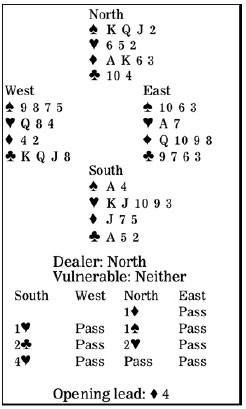Declarer rule may save the day
( China Daily ) Updated: 2017-11-25 07:51:33
If you watch declarers, you will see that when they are about to play a low card from hand, experts rarely table their lowest one, but less-experienced players almost always do.
Here is a good rule for declarers: When playing a spot-card from the closed hand, don't drop the lowest one; instead, play the next one up.
There are various reasons for that, the primary being to scramble the defenders' signals. But there is also the reason in this deal.
The auction cruised into four hearts, South's two-club rebid being fourth-suit game-forcing.
In theory, no lead defeats the contract, but West made a good choice with the diamond four. Maybe declarer should have taken that on the board and attacked trumps. But he ducked and lost the trick to East's queen. Now a club shift would have been fatal, but East tried to give his partner a diamond ruff. South won with his jack, cashed the spade ace, crossed to the spade jack and led the heart two. East rushed in with the ace, and declarer should have followed the rule, playing his nine, but he contributed the three.
East gave his partner a diamond ruff, and West exited with a spade. South led dummy's last spade, but East ruffed. Declarer overruffed and cashed the heart king to draw trumps.
South had lost three tricks and had a club loser left in each hand. He had the diamond ace on the board, but no way to get there. It had the heart six, but declarer no longer held his three. He had to concede down one.
|
|
|
|
|
|
|
|

























 Raymond Zhou:
Raymond Zhou: Pauline D Loh:
Pauline D Loh: Hot Pot
Hot Pot Eco China
Eco China China Dream
China Dream China Face
China Face






